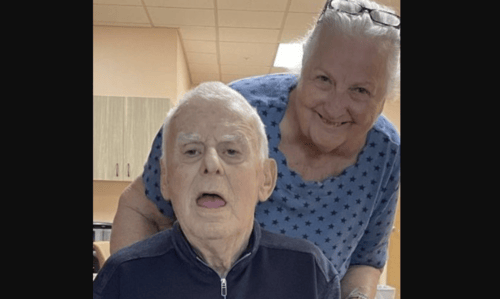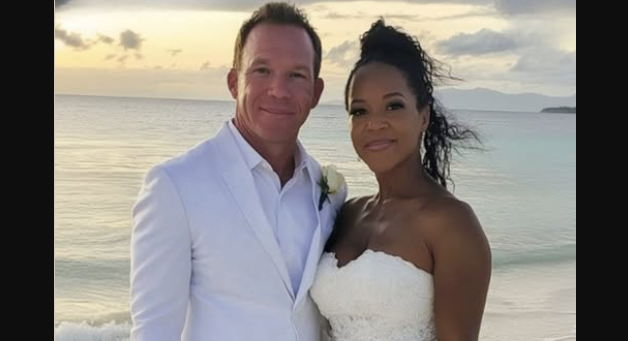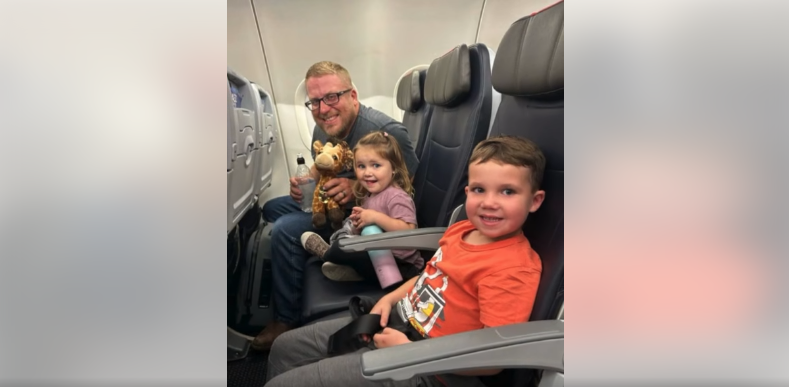It had been almost an entire year since his memory began to fade.
At first, it was minor things: misplacing his keys, or calling the dog by my brother’s name.
But the decline accelerated quickly.
Too quickly.
Within months, Dad could barely construct a complete sentence without his words trailing off into silence.
The only name he still uttered with any certainty was Mom’s.
We visited him every Wednesday without fail.
It was always the same room.
The same soft, wistful smile.
The same distant, faraway look in his eyes.
He’d nod in recognition when we walked in, as if he yearned to place us but couldn’t quite connect the dots in his mind.
But last week, something entirely new happened.
We were midway through our visit; Mom was gently adjusting his blanket while I attempted to coax a story from him.
I prompted, “Tell me again how you and Mom first met at that old diner.”
And he looked at me then, truly looked at me, and said, with startling clarity:
“That wasn’t her. That was Elsie.”
I blinked, momentarily stunned.
“Who is Elsie?” I asked, utterly bewildered.
He frowned, then glanced nervously toward Mom, before looking down at his lap like a child who realized he’d divulged too much.
I initially dismissed it as a simple slip of the tongue.
Perhaps a distant memory entangled with another.
But the name Elsie lingered persistently in my mind, circling relentlessly all night long.
I casually asked Mom about it after we left, careful not to stir up any immediate trouble.
She paused, deliberately folding her coat over her lap.
“He must have meant someone else,” she replied, her voice a little too quick, a little too smooth.
“There was no Elsie. Perhaps he meant a waitress at the diner?”
Her voice had an unnatural smoothness, like someone quickly closing a drawer before you could catch a glimpse inside.
So I did what any restless and suspicious son would do.
I went home and began sifting through the old family boxes.
The ones stored in the attic that we rarely opened unless we felt nostalgic, or in my case, deeply suspicious.
There were hundreds of faded photographs, mostly in black and white.
Faces I didn’t recognize from long-forgotten birthdays, and blurry snapshots from road trips in dusty, vintage cars.
But one particular photo stood out strikingly.
It was tucked carefully behind another frame.
A small, square photograph with noticeably creased corners.
Dad, possibly in his early twenties, stood beside a girl I didn’t recognize.
She was laughing joyously, holding a delicate bouquet of daisies, and he was looking at her with the kind of gaze reserved for one’s entire world.
On the back, inscribed in shaky penmanship: Summer ’66 – Elsie’s garden.
I didn’t sleep a wink that night, my mind racing.
During our next visit, I waited until Mom stepped out of the room to get tea.
I leaned in close to Dad and whispered, “Tell me about Elsie, Dad.”
He looked at me again, his eyes clearer than they had been in months.
“She had a voice like the radio,” he said softly, a distant fondness in his tone. “Warm. Full of music.”
“Was she… before Mom?” I asked gently.
He nodded almost imperceptibly.
“We were planning to leave town,” he continued softly. “Get a cabin upstate. She always said daisies were her favorite because they didn’t demand too much.”
I swallowed hard, a lump forming in my throat.
“What happened to her?” I pressed, needing to know.
He looked away, his gaze clouding over once more.
“She grew tired of waiting for me to be brave,” he murmured.
And that was it. He drifted off again, his consciousness receding like a tide pulling back from the shore.
I didn’t tell Mom about this discovery immediately.
I wasn’t sure how to, or if I even should.
But I couldn’t let it go, the mystery gnawing at me.
I meticulously searched every newspaper archive I could find online.
I scanned old records, birth certificates, and grim death notices.
For weeks, I found absolutely nothing, just frustrating dead ends.
Until one night, I serendipitously stumbled across an online forum dedicated to small-town history buffs.
I posted the photo, cautiously asking if anyone recognized her. I honestly didn’t expect any replies.
But two days later, someone surprisingly responded.
Her name was Elsie Martin.
She used to live in a town about an hour’s drive from where Dad grew up.
She went missing in 1967.
There was no official record of her after that year.
No obituary.
Just… gone.
My stomach violently flipped with a sudden jolt of dread.
Missing?
I quickly replied, asking for more details.
The person sent me a digitized copy of an old local newspaper article.
The headline chillingly read: Young Woman Disappears Without a Trace—Foul Play Suspected.
I stared at the alarming article for a very long time.
She had last been seen with a man: tall, with dark hair, driving a blue Dodge.
My dad drove a blue Dodge at that time.
I didn’t want to believe it was true.
Couldn’t bring myself to accept it.
This wasn’t some fictional crime show; this was my own father.
But something deep within me cracked open that night. Not fear, exactly. Not even doubt. Just… a profound need.
The kind of insistent need that won’t let you rest or find peace.
The next time I visited Dad, I brought the photograph with me.
“Is this her, Dad?” I asked, holding it out gently.
He held it with extreme care, as if it were fragile glass, fearing it might shatter if he even blinked incorrectly.
Then, softly, he said, “I waited too long. I told her to meet me by the bridge. But I never showed up.”
“Why not?” I pressed, my voice barely audible.
He wiped at his eyes, which had grown watery.
“I was scared,” he confessed. “Scared of starting over. Of leaving the only life I knew. I truly believed I had more time with her.”
I felt something sharp and painful lodge itself in my chest.
“Dad… did she leave town after that night?”
He shook his head slowly.
“She waited there. For hours. In the pouring rain.”
He looked up at me, his eyes watery but remarkably clear.
“She died that night. Her car went off the road on her way home.”
My mouth went completely dry, my throat constricting.
“You never told anyone about this, Dad?”
“I couldn’t. Her parents absolutely hated me; they thought I had run off with her. But I didn’t even have the courage to say goodbye.”
And then he uttered the profound line I will never, ever forget:
“I’ve spent fifty years forgetting things I desperately wanted to remember… and remembering the one thing I desperately wanted to forget.”
I didn’t know what to possibly say in response.
I simply held his hand. That was all I could do for him in that moment.
Later, I told Mom absolutely everything I had uncovered.
I expected anger. Perhaps a long, stunned silence.
But she just sat there quietly for a very long time, processing it all.
Then she softly said, “I always knew he had a ghost in his past.”
And in that moment, I realized she had loved him anyway. Loved him knowing he had once belonged, if only for a fleeting moment, to someone else entirely.
I visited Elsie’s hometown a week later.
I found the cemetery.
She didn’t have a grand headstone, just a tiny, simple plaque near the edge of the manicured grass.
I brought a fresh bouquet of daisies, her favorite flowers.
I knelt down reverently and whispered, “He didn’t forget you, Elsie.”
I didn’t expect anything extraordinary from the visit.
Just a sense of closure, perhaps.
A small peace offering between a painful past and the present.
But when I returned to the care home the very next week, something profound had shifted in Dad.
Dad was quietly humming a tune.
I hadn’t heard him hum in months, and it was a melody I didn’t recognize—soft, sweet, and gently lilting.
“Is that Elsie’s song?” I asked tentatively.
He nodded, a faint smile gracing his lips. “She used to sing it while planting flowers.”
From then on, every visit felt a little lighter, a bit more serene.
He still occasionally forgot our names.
He still sometimes lost the thread of conversation, drifting off.
But that deep sadness—that heavy, persistent fog—lifted noticeably.
It was as if finally telling her story had created space within him for the rest of us again.
He passed away four months later.
Peacefully.
In his sleep.
We buried him next to a beautiful tree near our old family house.
Mom carefully picked the spot for him.
“I think he’d like to be somewhere that sees the seasons change,” she said softly.
And we all silently agreed with her.
That fall, I went back to Elsie’s grave.
I placed a second, fresh bouquet of daisies.
And next to them, a small, handwritten note.
He remembered you in the end.
The profound twist in this story? He hadn’t merely been forgetting things due to his condition.
He’d been holding on fiercely.
To crushing guilt.
To deep regret.
To a forgotten love that had no proper place to go in his life.
And when he finally allowed it out—when he courageously spoke her name aloud—he ultimately found a way back to us, to his living family.
Sometimes we mistakenly believe people forget because they simply don’t care enough.
But sometimes… it’s precisely because they care too much, bearing a heavy burden.
Life doesn’t always provide neat, tidy endings to our stories.
Some narratives linger persistently in hidden corners and deep shadows, waiting decades for a single, illuminating moment of light.
But when that powerful moment finally comes—it truly matters deeply.
If this story touched your heart in any way, please share it with someone you profoundly love.
Maybe there’s an “Elsie” they’ve been silently holding inside too, waiting to be acknowledged.
And if you ever feel utterly forgotten, just know—some cherished memories are simply too important to ever completely fade away.
You’re not truly lost.
You’re just patiently waiting to be remembered by someone who cares.




